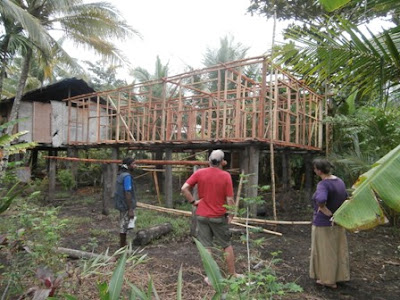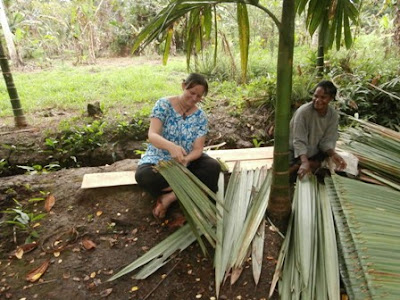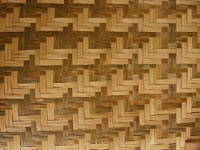There is a fine line between a child's smile and their tears, and it is a
gamble which one you will get.
1. Smile
Scenario: child is staring at you, so you smile at them.
Response:
J
She smiled at me! I’ll smile back!
L
Look at those teeth! Surely she wants to eat me. Wah!!!
 |
| photo: ywamships.org.au |
2. Speak language
Scenario: you try out the little language you know and say
‘Good morning, my name is…”
Response:
J
Ha ha ha! She sounds silly!
L She knows our language… she must be a
returned spirit of our ancestors and now I’m scared. Wah!!!
3. Help with steps
Scenario: toddler is standing at the top of steps they can’t
climb down crying for someone to help them, so you help.
Response:
J
Yay! She helped me and I got to zoom through the air!
L
She touched me! Wah!!!
4. Children and
knives
Scenario: small child wants to play with big sharp knife and
you let them…
Response:
J
I got the knife! It’s what I wanted!
L
I cut myself! Wah!!!
…or you take it away from them.
J(eventual)
safe child, no wounds, finds another toy
L
(initially) she took my toy from me! Wah!!!
5. Immunisations
Scenario: Medical ship comes to town and you help
with immunisations.
Response:
J
(eventual) Child does not get seriously ill from a preventable disease.
L
(initial) She stabbed me! Wah!!!
 |
| immunisation tears (photo: ywamships.org.au) |
6. Lolly
Scenario: you give the child a lolly
Response:
J
Sweet! Yummy!
L
(eventual) rotten teeth, very limited access to dentists, and ongoing pain.
Wah!!!
7. Literacy Testing
Scenario: you help with literacy testing as part of
ongoing research into what helps and hinders literacy in the region.
Response:
J
(eventual) Child grows up literate, gets work and helps their family.
L
The white woman is asking me questions. I thought I knew what that mark on the
page meant, but now my mind has gone blank with fear. Wah!!!
 |
| How does class size and resources affect literacy levels? |
8. Walk through the
village
Scenario: As you walk from the house to the toilet and back,
you pass a child.
Response:
J
Yay! The reality TV star just walked by and made life interesting.
L
She’s a ghost, I’m sure of it! Wah!!!
True
story: there was one child of about 3 years of age who cried every time I
walked past his house. One time as I passed by he was playing with his bow and
arrow. In fear, he froze, pointing it at me and crying. I was a little
concerned that fright would turn into fight and that I was about to get an
arrow in my leg! Thankfully he remained frozen and I continued on my way.
 |
| Shooting practice…just don’t aim at me! |
9. Make eye contact
Scenario: yet another child is staring at you, and you
briefly make eye contact.
Response:
J
She’s real! She’s friendly!
L
The ghost lady noticed me! All sorts of bad things could happen now! Wah!!!
The longer I am in the village, the more that children are
familiar with me, the less fear I create and the more smiles I receive, but the
tears are still there sometimes.


























